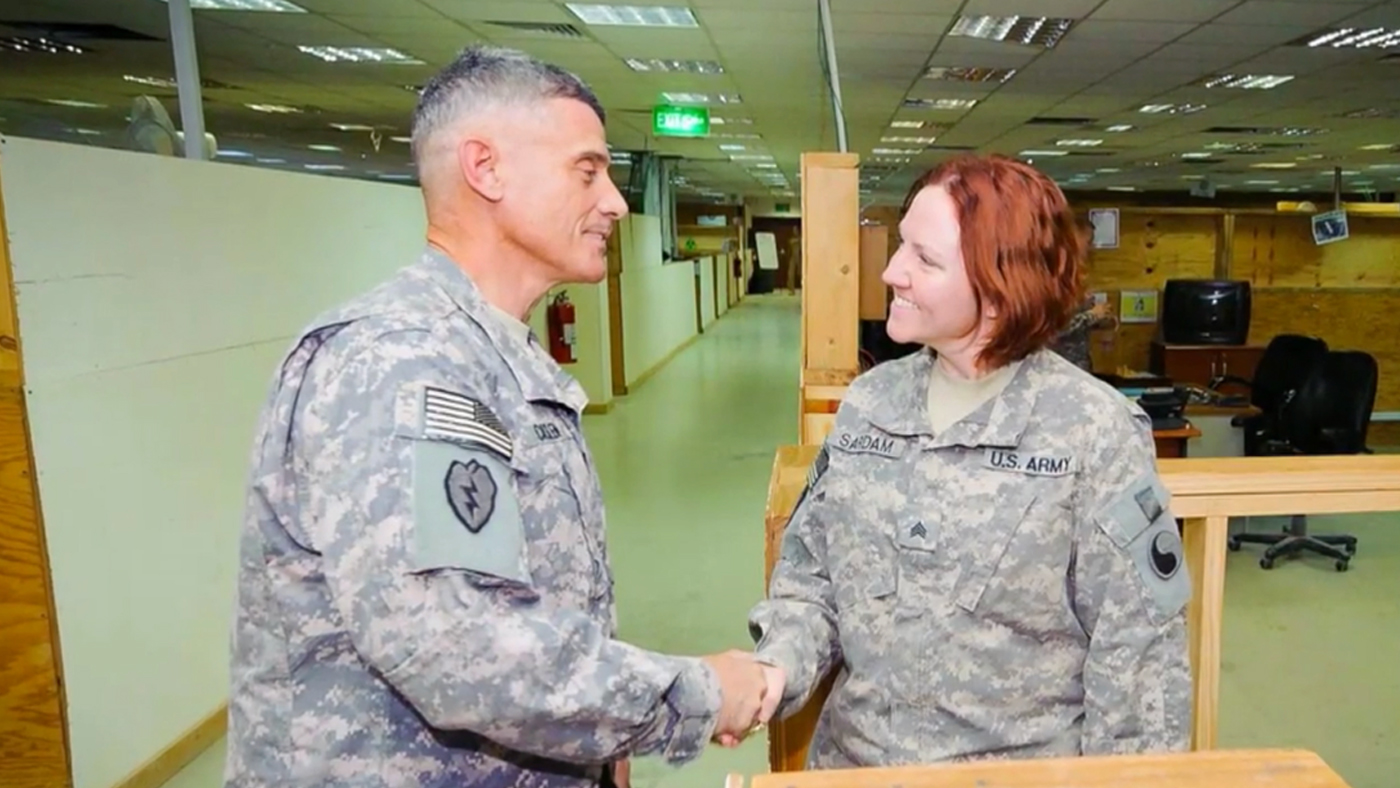When you think of autism, what comes to mind? Do you think of a limiting disorder, a stereotype or a condition only found in childhood?
It’s likely we may not realize the face of autism could be someone we know. It could be your best friend, your colleague or your boss.
Would you know if it was you?
Our human experiences are subjective. Barring certain serious conditions such as loss of sight or hearing, we may not always realize the variations in how we experience the world apart from others.
As an individual, you’re entrenched in the never-ending, constantly unfolding sensory experience of “you”—most everything you know comes from how you alone perceive and move through the world.
I never knew I was autistic all those years.
It was just who I was.
Like looking into a mirror
Then I began to glimpse my past in the struggles of my now 10-year-old daughter. Like a mirror, she reflected my own childhood back to me, ripe for reexamination.
Like her, I couldn’t speak in most situations as a child and was a loner. It was so much more than shyness and being “book smart” though.
I was quirky and a bit of a nonconformist. But autism? Of course, I was aware of the word, but I didn’t fully understand.
As a teenager, I found hope in writing poetry and poured my soul into it. I also got a little better at public speaking as I found my flow, winning my school’s ninth grade spelling bee and competing in a French language competition thanks to a teacher who took me under her wing.
Empowerment and education
Although I continued to fight anxiety and depression for decades, I got better at small talk, job interviews and networking in crowded situations.
It wasn’t until I turned 50 that I learned there were adults like me with undiagnosed autism. Not long after that I also learned that unconsciously masking these autistic traits can lead to long-term mental health outcomes such as what I had experienced with anxiety, depression and burnout.
I served 22 years in the military—two combat deployments—most of them as an Army journalist. But knowing what I know now, it’s much clearer to me how and why I felt I had to work so much harder to achieve the same goals as others.
Why do I share this?
This is only one lived experience, one story among millions. I cannot speak for everyone who is autistic.
I just hope my story helps to encourage others to want to learn more.
Autism is a spectrum and not a one size fits all. It is not a disease; it’s a developmental disorder or, better yet, a “differently wired” brain.
For me, whether I recognized it or not, it was with me all along, but it doesn’t change who I’ve always been, my resilience, my core values or my work ethic.
I choose to find empowerment in my newfound knowledge. It allows me to embrace more fully who I am.
I gaze back on my early years now with more clarity, feeling more kindness and understanding toward my estranged dad who rarely made eye contact and never was one for hugs.
This has become such a personal passion of mine that I started a Facebook group to connect with other autistic military Veterans.
So far we are 75 members strong. Our stories are unique, set against the backdrop of our shared military service, each shaped by our individual experiences viewed through the lens of autism.
Neurodiversity awareness
Autism is included under the umbrella that is known as “neurodiversity.” This refers to differences in brain functioning and includes conditions such as ADHD, obsessive-compulsive disorder, Tourette syndrome, dyspraxia and learning disorders, such as dyslexia and dyscalculia.
Individuals or groups that exhibit these variations are considered “neurodivergent.” Estimates are that 15-20% of the world’s population exhibits some form of neurodivergence.
And many people with autism have comorbid conditions. I have mild Tourette syndrome, ADHD and PTSD, and I’ve been referred to be screened for dyspraxia and nonverbal learning disorder to try and help me work out why I’ve had a life of “clumsiness” (motor coordination and spatial awareness issues).
The way forward
Though there may be challenges with managing autism in the workplace—such as social anxiety or being hypersensitive to light or sounds—there are also unique strengths. I believe my skills in writing and editing are partially fueled by being on the spectrum.
The private sector has begun to catch on to the potential benefits of neurodiversity to the entire workforce. The National Geospatial-Intelligence Agency launched its neurodiversity pilot in late 2020 with a focus on hiring autistic individuals. It took a long pause to thoroughly evaluate the results of this program and now plans to build on these efforts later this year.
Recognizing and accepting the potential of this rich tapestry of nuances to be found within the neurodivergent community can only strengthen our relationships in the workplace, as well as our VA mission, adding to a better understanding of the care we provide to our Veterans, their families, caregivers and survivors.
Charting your own path
If any part of my neurodivergent experience sounds familiar to you, here are some suggestions:
- Seek out reputable websites and read the stories of others who may be late-diagnosed or identify through their lived experiences; see how these resonate for you.
- Join an online community to connect with others on similar journeys.
- Keep a journal as you do your research and think back over your life. The information can be overwhelming, so it’s helpful to get everything into one accessible place. Should you decide to move forward and seek a formal assessment, your notes could prove to be helpful in that process.
Topics in this story
More Stories
At VA, we put women Veterans at the center of your care with a personalized Whole Health approach for your unique needs and goals.
This month's Center for Women Veterans Book Corner author is Navy Veteran Kimberly Henry, who served as a Cryptologic Technician and Sexual Assault Victim Advocate from 2009-2019. She created "Warrior's Path to Healing: A 12-Week Empowerment Journal for Women Veterans."
Thinking about building a family or exploring fertility treatments? VA can support you with a wide range of services.







For Jennifer Davis:
Sharing my experience and layperson understanding in case it helps. I don’t have an autism diagnosis, but have adult friends, and child relatives, who do. Please take what helps, leave the rest, and keep in mind this is the comments section of a brief article!
Autism / Autism Spectrum Disorder (ASD) is currently diagnosed in line with DSM 5 criteria.
It is considered a DD ( developmental disorder). This means it was not caused by an event, but was present from birth.
My understanding of VBA benefits for service connected disabilities is that they would not apply to or include a DD/ developmental disability that was present at birth.
The diagnosis of Autism Spectum Disorder can be missed as a diagnosis for a number of reasons, including:
– changed criteria: DSM4 vs DSM5
– testing and assessment can require providers have specialized training, limiting the number of provides who are trained in and specialize in diagnosis
– many insurance companies will not pay for assessment/ evaluation. This can range in cost from several hundred dollars to a few thousand dollars if paid out of pocket.
– Many / most insurance companies will cover SERVICES for a diagnosed condition or disorder.
– “Services for” and “evaluation” are different and differently covered by insurance
– many girls may present differently than boys, and this difference can and has led to many girls having a missed diagnosis until late adulthood
– ASD / Autism Spectrum Disorder covers a wide range of presentations, and these presentstions can vary
It you think you may benefit from assessment, you could ask your PCP to recommend practices or providers who assess and evaluate adults for ASD. Then when you have some recommended names, call them to ask about wait time, fees, and if they accept insurance.
Call your insurance company to ask them to email you in-network providers who screen / assess for ASD
Here are links from Autusm Speaks, Mayo Clinic, and Psychology Today for more reading.
https://www.mayoclinic.org/diseases-conditions/autism-spectrum-disorder/symptoms-causes/syc-20352928
https://www.autismspeaks.org/advocacy-news/va-disability-autism
https://www.psychologytoday.com/us/therapists?category=autism
Hi SGT. Sardam,
Your story is something that I relate to. How can we join the Facebook group? Is there a specialist you can recommend others look into if the avenues they’ve been seeking before haven’t panned out?
Thank you for sharing!
She stopped replying when asked for specifics. There’s nothing in this story that said a doctor diagnosed her. She won’t answer is a VA doctor even SAW her. She’s presented ZERO evidence. VA ran a story that can’t even be verified. Sounds like fake news!
This was a very interesting read, something I identify with. There’s so many ch information in here. It would be helpful if Ms. Sardam could provide even more to help others. Can someone ask Ms. Sardam to answer a few follow up questions to help someone battling these unknowns?
– Did you see a VA doctor for all these issues?
– What questions did you ask your doctor when you got the news?
– Did your PCM send you to specialists?
– What were the wait times like?
– What’s your advice on managing all these doctor’s appointments?
– Are there any exercises or diet changes your doctor gave you?
– What medical paperwork did your doctor provide you to give to your employer?
– Is it possible to seek disability pay for these conditions? What was your experience like if you did?
– Why do you think the Army missed these diagnoses when you joined?
– Why do you think nobody recognized these issues during your 22-year career?
Hi, Jennifer. I regret that I can’t speak to some of these questions as they are more on the private medical side. However, I can share that with different versions of the Diagnostic and Statistical Manual of Mental Disorders (DSM) the parameters for what qualifies an individual for an autism diagnosis have shifted. Some people who weren’t considered autistic years ago are now being classified as on the spectrum.
And being autistic can look like many different things. It’s not always noticeable to everyone around them what an individual is going through, especially if he or she has been unconsciously masking to fit in for decades. Every person with autism is different and has different support needs. There’s a well-known saying by autism advocate Dr. Stephen Shore: “If you’ve met one person with autism, you’ve met one person with autism.” We are just as different from one another as anyone else.
Good luck on your journey!
Wait a minute. You said “I regret that I can’t speak to some of these questions as they are more on the private medical side.” This is after you wrote hundreds of words, including “I have mild Tourette syndrome, ADHD and PTSD, and I’ve been referred to be screened for dyspraxia and nonverbal learning disorder to try and help me work out why I’ve had a life of “clumsiness” (motor coordination and spatial awareness issues).”
You can’t answer if a VA doctor saw you? You can’t give a broad overview of questions asked? You can’t pass along broad advice a board-certified doctor gave?
Now that I read this back, there’s ZERO mention of a doctor giving this diagnosis. You said “It wasn’t until I turned 50 that I learned there were adults like me with undiagnosed autism.”
Without an actual doctor saying this, how do any vets (including me) know this is true? Did anyone with a medical degree review this column before it was posted to see if it was accurate?
I would like a response, as I will contact my member of Congress about VA putting out information without it being properly vetted first.